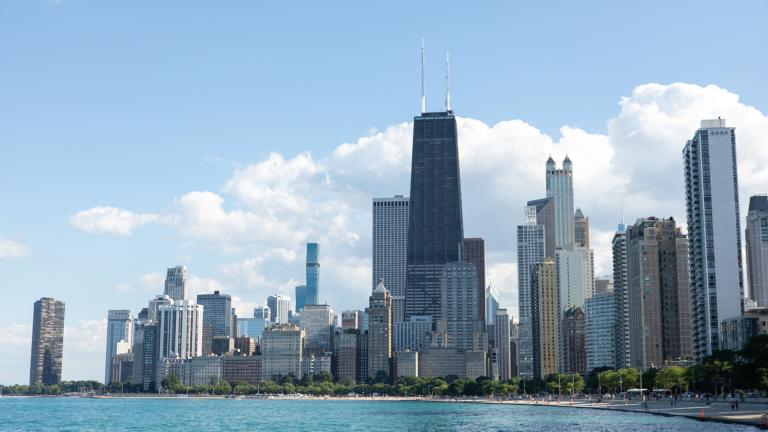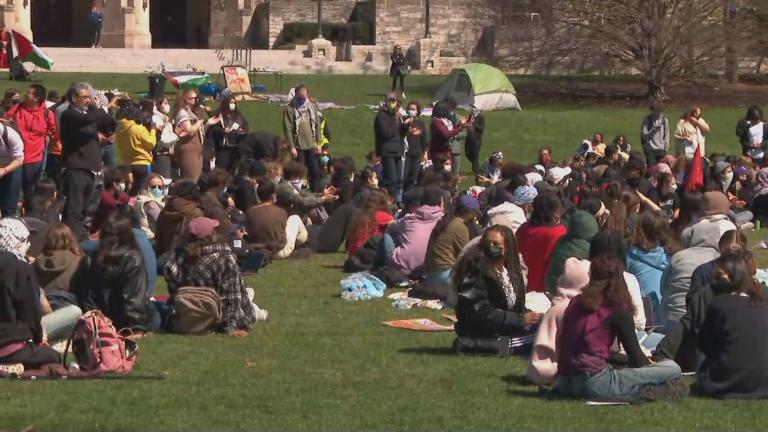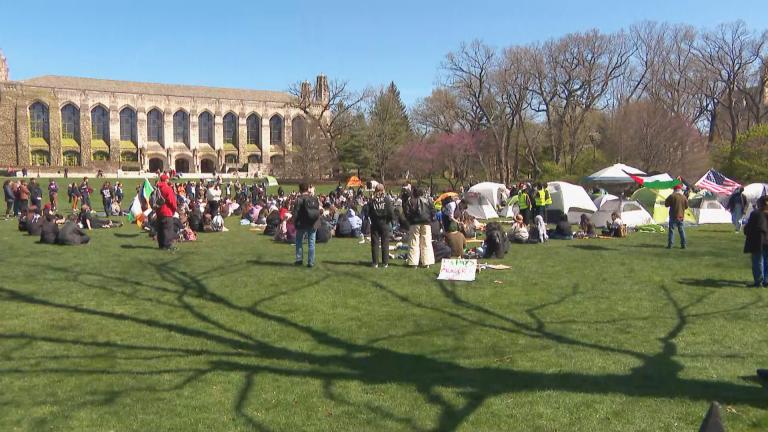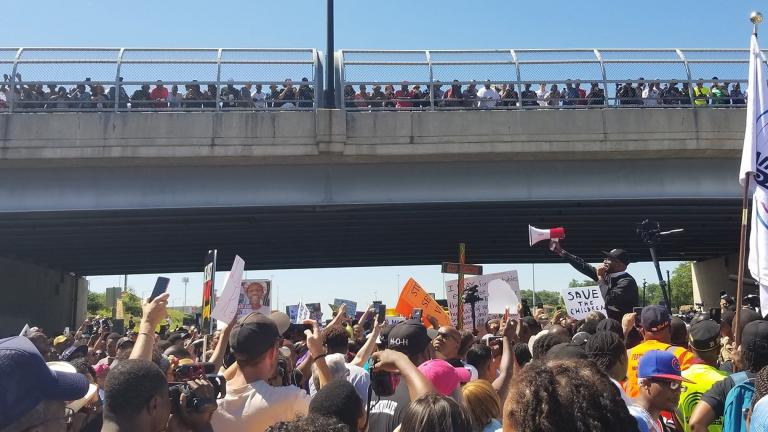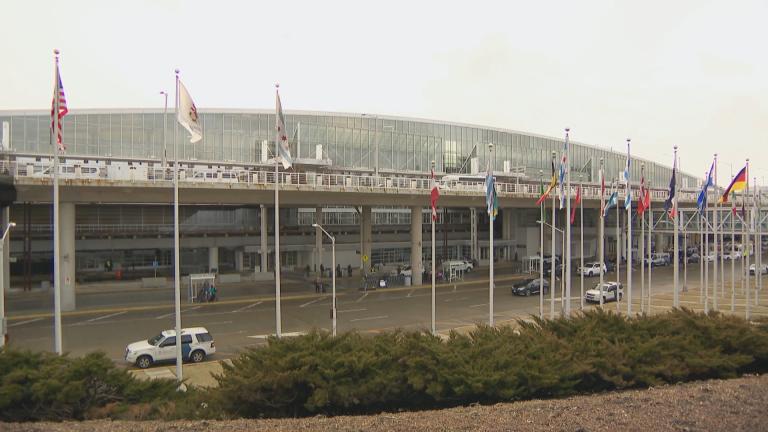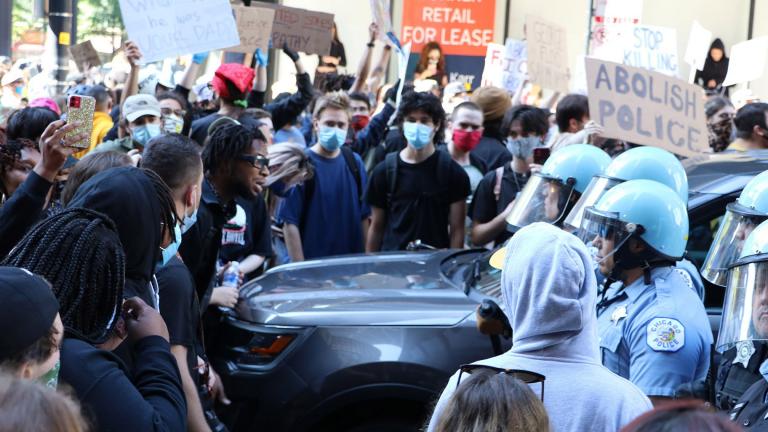Chicago taxpayers have spent at least $5.6 million to defend and settle lawsuits alleging Chicago police officers committed a wide range of misconduct during the protests and unrest during the summer of 2020 that were triggered by the police murder of George Floyd, according to an analysis by WTTW News.
Nearly $2 million of that toll went to pay private lawyers to defend the conduct of CPD officers from late May until mid-August 2020, one of the most tumultuous periods in Chicago history, according to records obtained by WTTW News through a Freedom of Information Act request.
Chicago taxpayers paid a premium to hire private attorneys to defend the conduct of CPD officers even though two probes found officers beat protesters with batons, doused their faces with pepper spray, used racial slurs and mocked the push for racial justice and police reform. In many cases, that conduct violated protesters’ First Amendment rights and involved unjustified and excessive force, according to the probes.
The city’s inspector general concluded that the Chicago Police Department botched nearly every aspect of its response to the protests and unrest, while the independent monitoring team charged with enforcing the federal court order requiring CPD to change the way it trains, supervises and disciplines officers found the department was “unprepared for the level of sustained protests and unrest downtown and throughout its neighborhoods.”
In addition to the cost of outside attorneys, Chicago taxpayers spent an additional $3.6 million to settle 32 lawsuits identified by WTTW News that were filed by Chicagoans who said they were the victims of misconduct by CPD officers during the protests and unrest.
However, just three of those lawsuits were settled by a vote of the Chicago City Council because they called for payments of more than $100,000.
The largest payment — $1.62 million — went to five people who were pulled from their car by seven Chicago police officers and beaten outside the Brickyard Mall. The remaining lawsuits were settled with the approval of Corporation Counsel Mary Richardson Lowry, the city’s top lawyer.
Twenty-nine of the lawsuits identified by WTTW News that were resolved without City Council approval were resolved with an average payment of $55,566. In 10 of those cases, Chicago hired outside lawyers to defend CPD, costing taxpayers an average of $46,200 per case, according to records obtained by WTTW News.
WTTW News’ analysis is the first to determine the cost to Chicago taxpayers of police misconduct during the protests that erupted during the summer of 2020 — a toll that is sure to grow with 13 cases pending in federal court — and is the first to report that city officials relied on private attorneys to defend the conduct of CPD officers that two probes castigated.
The lawsuits settled by the city alleged officers repeatedly used excessive force at protests that erupted across the city throughout the summer of 2020 — in the shadow of Trump Tower and at the Brickyard Mall on May 30; in River North on May 31; in Uptown on June 1; in Grant Park on July 17 and on the Wacker Avenue bridge over the Chicago River on Aug. 15, according to court records.
WTTW News’ analysis was prompted by the fact that the Law Department does not systematically track why lawsuits are filed against the city, complicating efforts by the City Council, the news media and outside groups to track the cost of CPD’s botched response to the protests and unrest and repeated use of excessive force against protesters.
Chicago’s Law Department routinely hires outside law firms to defend the CPD in complicated, complex lawsuits alleging officers committed serious misconduct in the hopes of reducing the cost to taxpayers if a settlement is reached, officials said. In the rare cases that go to trial, private lawyers can often wage a more aggressive defense of CPD’s conduct than members of the city’s Law Department, which has suffered from staffing shortages for more than a decade.
That expertise comes at a significant premium, costing Chicago taxpayers four to five times more than in-house lawyers, according to estimates offered during City Council budget hearings where these costs are a perennial sticking point for budget-conscious alderpeople.
A spokesperson for the Law Department declined to answer specific questions about why the city has hired outside law firms to defend the lawsuits accusing police officers of misconduct during the summer of 2020, citing attorney-client privilege. Richardson Lowry declined an interview request from WTTW News.
“The city’s Law Department internally evaluates each case for potential risk and liability and takes appropriate steps to minimize financial exposure to the city,” said spokesperson Kristen Cabanban. “In some cases, we conclude that it is in the best interest of the city to use internal lawyers and in other cases we retain outside counsel.”
Sheila Bedi, an attorney who represented the coalition of police reform groups that sued the city to force CPD to change the way it trains, supervises and disciplines officers in the wake of the 2014 police murder of Laquan McDonald, said police targeted protesters with “unlawful violence” after the murder of Floyd prompted many people to call for wholesale changes to policing.
“The harm that people experienced on the streets during the summer of 2020 wasn’t just about individual officers making bad decisions,” Bedi said, “but was about the systemic failures of the department.”
Bedi told WTTW News it makes no sense for the city to hire outside lawyers to defend conduct that two separate probes found to be seriously deficient.
“It’s inexplicable,” Bedi said. “I can’t give you a legal rationale for it or even a financial rationale for it. Because there is certainly no benefit to taxpayers to dragging out this litigation even further.”
Determined to hold the city accountable for the officers’ conduct, Bedi filed a lawsuit in May 2021 on behalf of 60 Chicagoans who were injured by CPD officers. City officials paid two outside legal firms $1.3 million to fight that lawsuit, succeeding in convincing a federal judge to require individuals to sue the city separately.
Among the federal lawsuits first filed by Bedi in 2021 still pending against the city nearly four years after the protests and unrest is the one filed by Miracle Boyd, who was an 18-year-old activist planning to attend DePaul University during the summer of 2020.
While protesting the presence of a statue of Christopher Columbus in Grant Park, Boyd was filming an arrest when an officer knocked her phone out of her hand, sending it into her face and knocking out one and a half teeth. The pictures of a bloody Boyd went viral, adding to the outrage over the way CPD officers responded to the protests.
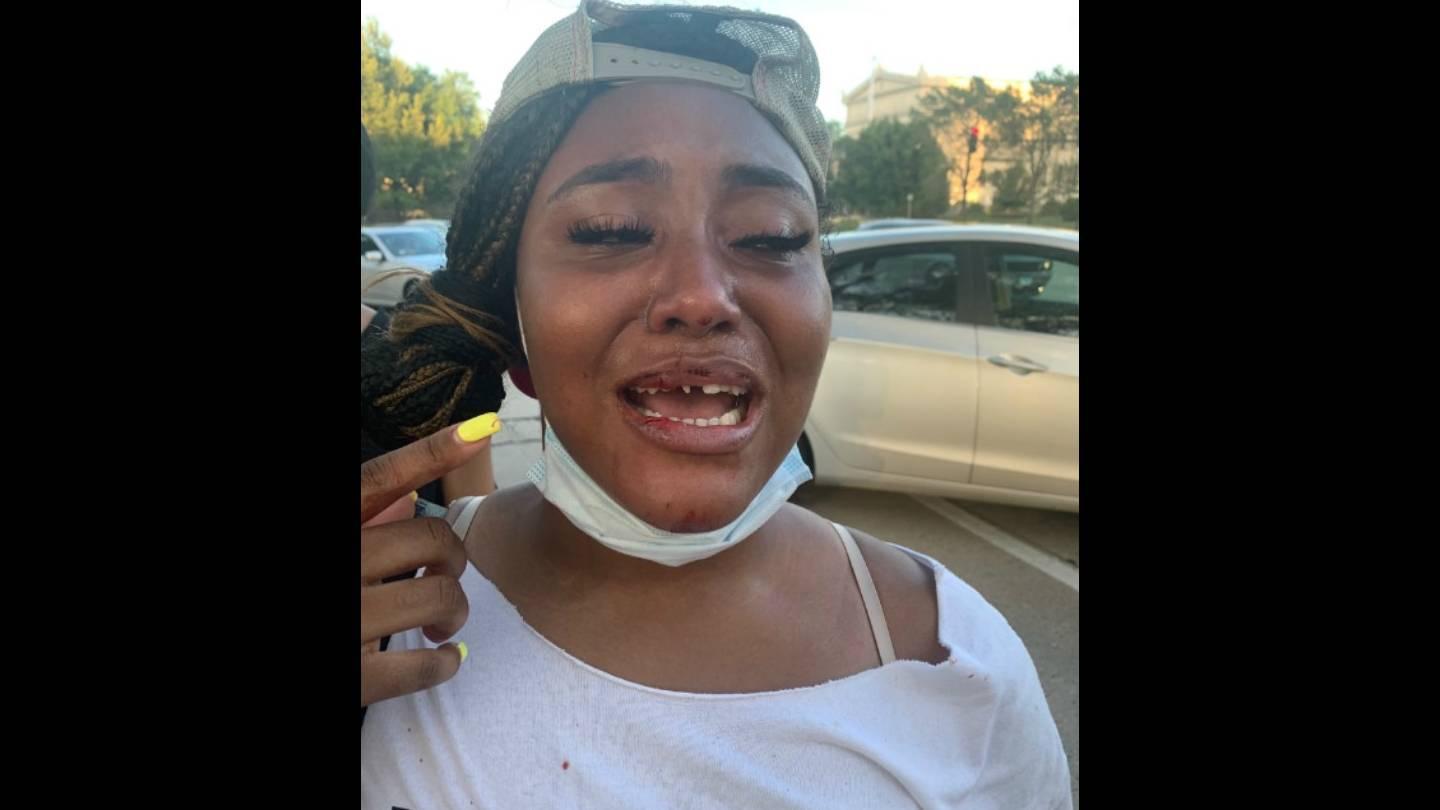 Miracle Boyd (Good Kids Mad City)
Miracle Boyd (Good Kids Mad City)
The Civilian Office of Police Accountability, the agency charged with investigating police misconduct, concluded the officer used excessive force, tried to prevent Boyd from recording police and made false, misleading or incomplete statements in his report of the incident. The officer resigned after COPA urged the superintendent to fire him.
“It is outrageous that we are still fighting this,” Bedi said. “What is there to defend?”
The city has spent more than $42,531 in legal fees to two law firms to defend the lawsuit filed by Boyd, according to records obtained by WTTW News.
“The attorneys can duke it out for another year or two and then, like most cases, we’ll likely settle on the eve of trial,” Bedi said. “Why the city of Chicago wants to do that in this particular situation, where the harm has been so well established, and where the harm was targeted toward people like Miracle Boyd, who have sacrificed so much to make the city a better place, it is just something I can’t understand or explain.”
In addition to the loss of her front tooth, Boyd said she suffered nerve damage and pain — even after she underwent reconstructive dental surgery — and had to drop out of DePaul University, where she had a scholarship.
She said she does not expect a financial settlement or jury award to repair the physical and emotional damage she suffered.
“I believe no amount of money can repair harm once it is caused,” said Boyd, adding that it could help her pay for college.
Boyd said the protest where she was injured was a defining moment of her life.
“It messed me up mentally for a long time,” Boyd said. “Today, I can watch the video and just brush it off my shoulder as if I just have to get over it. Because things happen like this. CPD, sometimes, they escape accountability. This is what happens. This is what we see. This is what’s been happening. So it wasn’t a shock.”
Boyd said there are better ways to have spent the more than $42,500 the city paid to a private legal firm to defend her lawsuit.
“Fifty thousand dollars could go into community, it could go into schools, it could go into violence prevention to save lives,” Boyd said. “Fifty thousand dollars to fight against little old me? And I didn’t do anything wrong? They need to put their money where their mouth is because that’s highly inappropriate.”
CPD Faces Renewed Scrutiny as DNC Approaches
The ability of the Chicago Police Department to lawfully police large demonstrations protected by the First Amendment faces renewed scrutiny as the city prepares to host the Democratic National Convention in August.
While Police Supt. Larry Snelling has repeatedly said CPD is prepared to respect protesters’ free speech rights and appropriately respond to violence during protests, a coalition of groups has asked a federal judge to reverse a policy that would allow mass arrests of protesters.
Bedi said the policy crafted by CPD brass is a “recipe for disaster” by allowing mass arrests when they are not permitted.
“We are very concerned that it suggests that CPD officers are prepared to have a retread of 2020 during the DNC and that this time officers are going to be able to say everything we did is within CPD policy,” Bedi said.
At a March 6 City Hall event designed to spotlight CPD’s efforts to prepare for the convention, Snelling pushed back on the inspector general’s report.
“There was civil unrest across the entire city,” Snelling said. “It was violent, there were vehicles burned, officers were attacked, people were murdered in the middle of this. I don’t believe the report accounted for that.”
However, Snelling acknowledged that officers were unprepared to handle the protests, echoing a key finding of the probe conducted by the team charged with monitoring CPD’s compliance with the consent decree.
“Our officers had not been properly prepared for that,” said Snelling, who was a member of the department’s command staff during the summer of 2020. “I will be the first to say that. Our officers were out without the training to deal with that type of situation.”
The independent monitoring team led by attorney Maggie Hickey called on CPD to undertake “immediate, deliberate, and transparent efforts” to “protect First Amendment speech while reducing the use of force and violence toward people and property.”
To ensure those changes are made, the monitoring team added 17 requirements to the consent decree, ranging from new rules governing efforts to prepare for large protests and civil unrest, to requirements that officers’ body-worn cameras be reviewed after incidents.
Cost to Taxpayers is Set to Grow
The City Council could vote as soon as May to pay $750,000 to a Chicago man who said CPD officers hit him so hard during a May 31, 2020, protest that they broke his leg and tore a ligament in his knee. The suit also claimed officers arrested the man without probable cause while using a racial slur city officials identified as the “n-word.”
The city paid more than $125,000 to an outside law firm to defend the lawsuit filed by Brian Meija before recommending that the City Council settle the case — after a judge ruled that CPD officers arrested Meija improperly and battered him, ensuring that he would receive a significant award after a trial.
The Finance Committee voted 25-6 on April 15 to advance the settlement to the full City Council after a heated debate.
Without evidence, Ald. Brendan Reilly (42nd Ward) suggested that Mejia was one of the protesters he saw throwing projectiles at police officers and said officers “displayed incredible restraint that day given all that was going on and the violence that was being directed toward them.”
However, Deputy Corporation Counsel Caroline Fronczak said the city and its attorneys have been unable to identify the officers who struck Mejia and then arrested him, making it impossible for them to argue to a judge or jury that the force used against Mejia was justified.
“No one from the city of Chicago can testify that Mr. Mejia acted outrageously,” Fronczak said. “In fact, there’s no one (who) can testify as to why he was being detained at all.”
Contact Heather Cherone: @HeatherCherone | (773) 569-1863 | [email protected]

